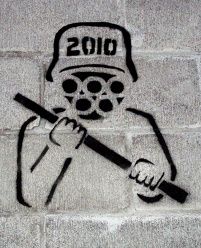Olympic Security Needs to Strike 'Balance'
Olympic security will need to strike a delicate balance
Vancouver Sun, August 4, 2009, Business section
It's now little more than six months before Vancouver hosts what will likely be the largest event in its history -- larger than Expo 86, and larger than 1997's meeting of leaders of the Asia Pacific Economic Cooperation.
The latter event, though it occurred more than a decade ago, is still fresh in the minds of many, and for all the wrong reasons. The RCMP pepper-sprayed, searched and arrested many protesters, which led the Mounties to become the main story of the APEC meeting.
It also led to a damning report from former judge Ted Hughes, who said the RCMP had "succumbed to government influence and intrusion in an area where such influence and intrusion were inappropriate."
Some people have expressed fear that the 2010 Winter Olympics could see a repeat of the APEC debacle, especially given the recent restrictive bylaw passed by Vancouver city council and given reports that police have been visiting known protesters and anti-Olympic activists.
But for the welfare of Vancouver, British Columbia, Canada and the police themselves, we must not see a repeat of 1997.
Now to be sure, policing the Olympics is no small feat. Vancouver's Integrated Security Unit, which is led by the RCMP and includes local police and private security, does have a formidable job to do.
The Olympics will see the influx of athletes, dignitaries and thousands of others from around the world, giving it, and Vancouver, the highest profile of any city on Earth. But for that very reason, anyone with a cause to publicize, or a perceived wrong to avenge, will see Vancouver as the perfect place to be, to be seen, and perhaps to cause trouble.
This means the integrated security unit will have to be prepared to prevent or combat everything from terrorism to garden-variety protests. And it will have to do so while ensuring that it not impair people's right to go about their business -- including protesting.
That's not an easy balance to strike -- indeed, security and freedom are often in tension, and it will be no different next year.
But the security unit must find the balance, and it must be aware that if it doesn't -- if it chooses to repeat the APEC fiasco -- the world will be a witness.
Indeed, if there's one difference between today and 1997, it's that cameras are more prevalent than ever. The police themselves record events, as do the media, governments and private industry through the use of CCTV.
But with the ubiquity of cellphone cameras, people are also watching the watchers, which means no one, least of all the police, can do anything in public without getting caught on video.
And this in turn means that the security unit must always be prepared to see itself on the nightly news, and must always behave in a way that will not embarrass itself, Vancouver, B.C. or Canada.
As the largest sporting event in the world, the Olympics presents an unequalled opportunity for Vancouver to showcase itself to the world -- and to bring many other opportunities to Vancouver for years to come.
Given this, that showcase needs to be a positive one -- we need to show the world that Vancouver, and Canada, are safe and secure, yes, but also welcoming and friendly.
And given that police officers' duties make them de facto ambassadors, it will be up to the integrated security unit to show the world that Vancouver and Canada value both freedom and security, in equal measure.
